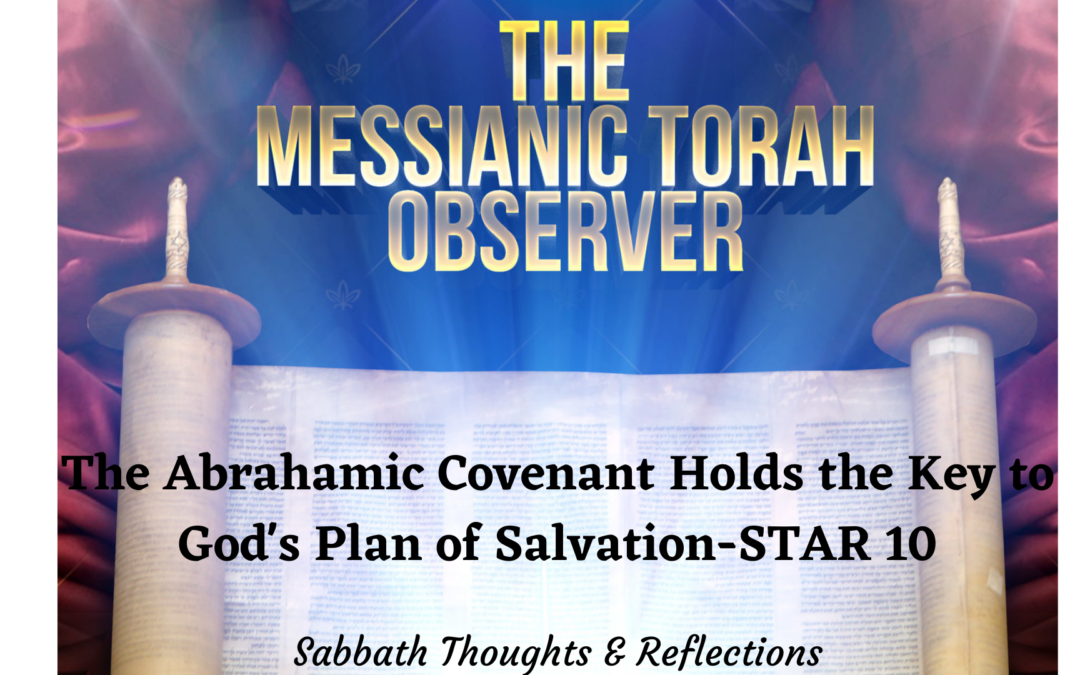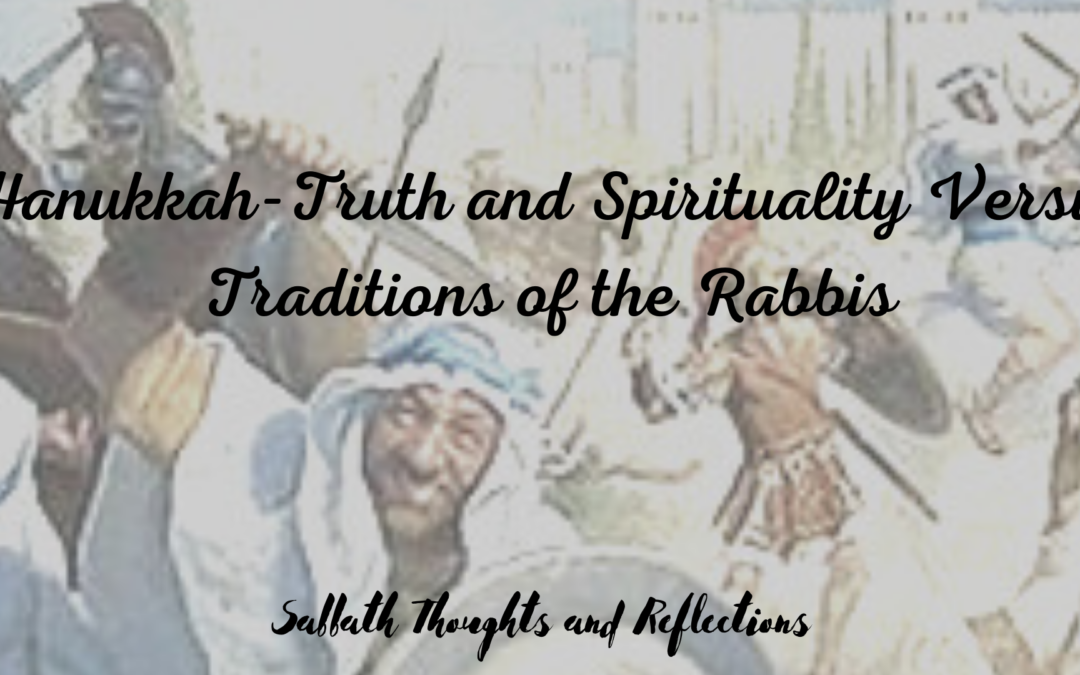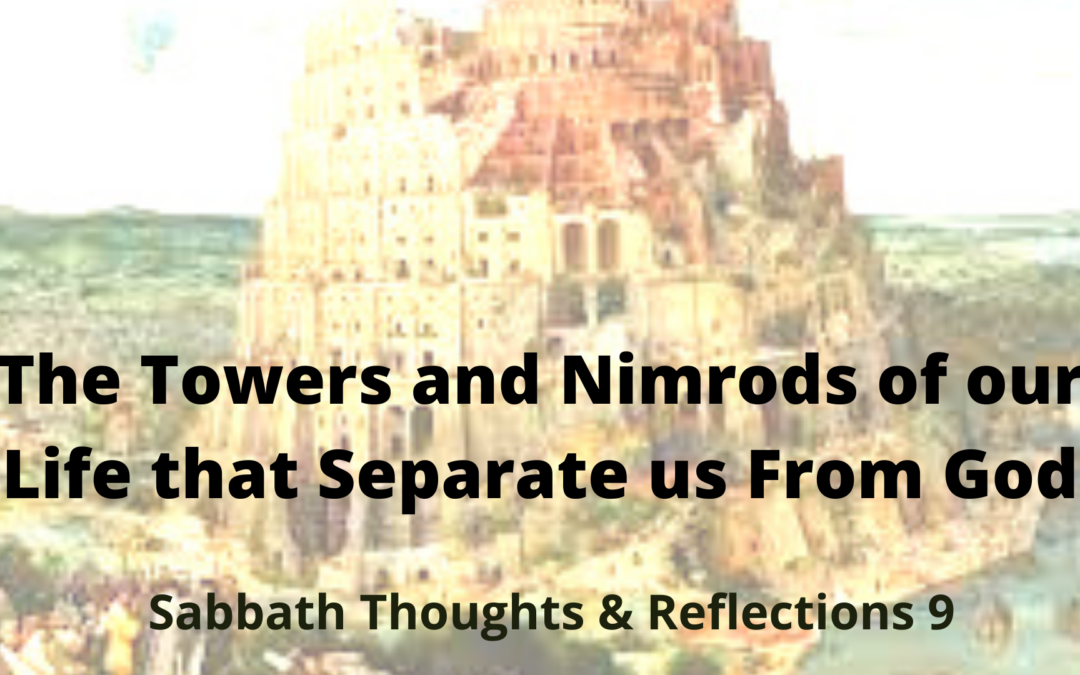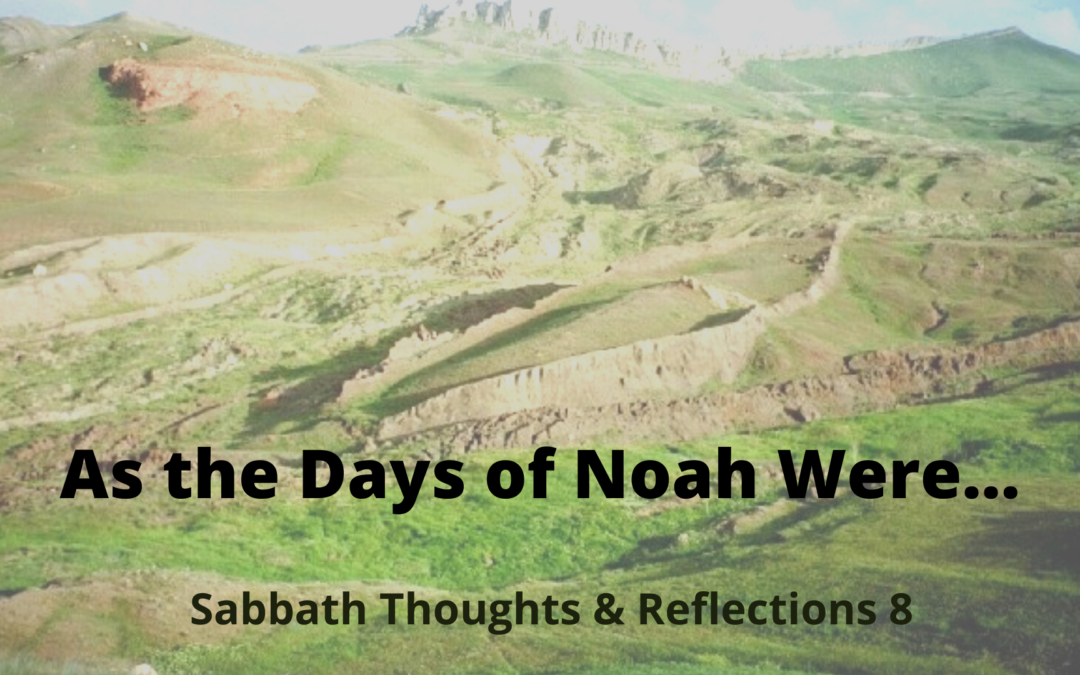In this installment we resume our Paul and Hebrew Roots Series with a brief introduction to the Book of Romans. We discuss what the Book of Romans is, and what it is not.
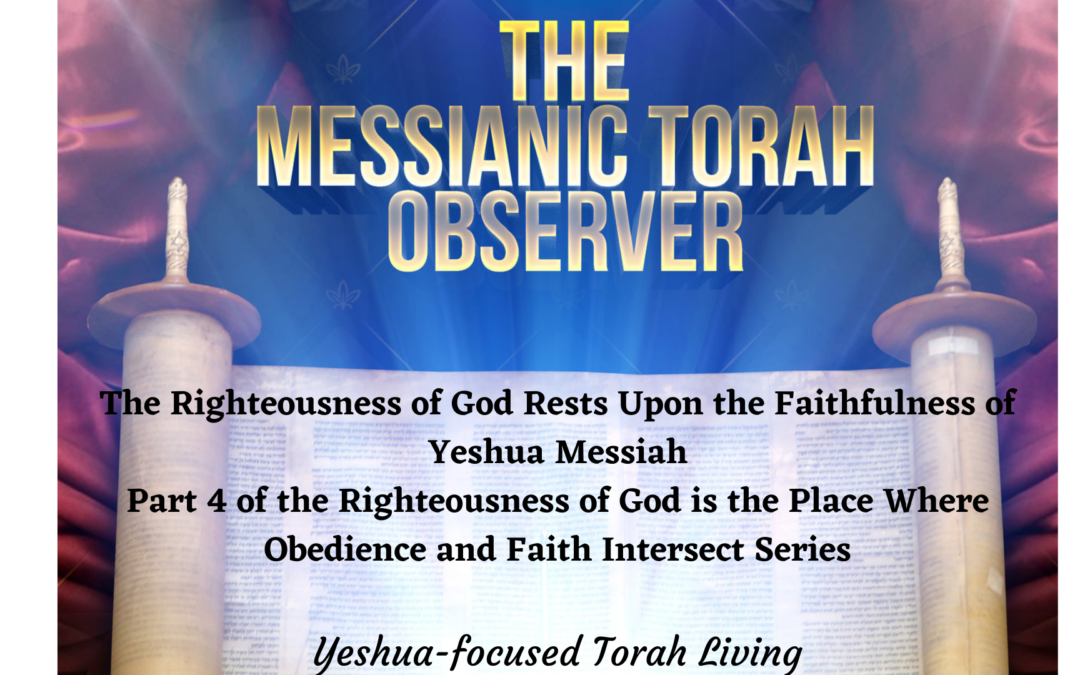
The Righteousness of God Rests Upon the Faithfulness of Yeshua Messiah
This is “The Righteousness of God Rests on the Faithfulness of Yeshua Messiah.” This is Part 4 of our series within a series that is entitled: “The Righteousness of God is the Place Where Obedience and Faith Intersect.”
Our focus passage for this installment will pick up where we left off in Part 3, looking primarily at Romans 3:22 and 23. In these two verses we will see the apostle continues his discussion of the Righteousness of Elohim.
Recall in part 1 of our series within a series (as well as in other installments of our overall Paul and Hebrew Roots series), we discussed how Yah’s Righteousness is manifested through His goodness and mercies; His Word, prophets and Yahoshua Messiah; as well as through His righteous judgment.
And then in part 2 we broke down what living by or walking by one’s faith looks like. And so, in that discussion, we linked Shaul’s teaching on the necessity of faith for one’s salvation and for a netzari’s or an elect’s walk in Messiah, to Habakkuk 2:4, where we saw that the impending wrath and judgment of Yah upon unrepentant Yisrael in the prophet’s day, required Yah’s remnant people to trust Yah to do what He’s going to do, and they simply continue to walk by/walk in/live by their faith.
Then in our last installment to this series, part 3, we set out to differentiate or distinguish between the terms or concepts of belief and faith. In that discussion, we concluded (or rather, I concluded) that belief is in fact different than faith. Belief is a more cognitive manifestation of one’s convictions or understanding of the things and ways and Person of Yehovah, while faith is manifested in action. And that action, in addition to a great many things, manifests in a netzari’s or elect’s entering into an obedient covenant relationship with the Creator of the Universe. The vast majority of people on this planet believe Yah exists: humans are hardwired to believe in Yah in some form or fashion. The distinction between Yah’s elect and the rest of humanity is that Yah’s elect trust in Yehovah to such a degree that they operate in an obedient covenant relationship with the Holy One of Yisra’el. We have as our example, Avraham, who not only believed that Yehovah existed and that He would fulfill every promise He made to Him, but He trusted Abba to the point of doing that which Abba instructed Him to do: to remove himself from his land, people and father’s home, and journey to a place that Yah would show him, as well as to go to the very brink of offering up his son Yitshaq in sacrifice unto Yehovah.
And thus, the Righteousness of Yah is manifested to the whole of humanity in a number of ways. The sad, and unfortunate fact of the matter is, however, that with the exception of a small, remnant of souls on earth, humanity has in the past and in the present, turned a blind heart, mind and eye to the reality of Yah’s Righteousness. But an additional reality is that Yah’s Righteousness has a shelf-life, if you will. Yah’s Righteousness in all of its manifestations will remain accessible to unrepentant, unconverted humanity only for so long before it is removed.
And so, as it relates to our focus passage here today, if we were to compare and contrast it to these four manifestations, it would on the surface appear that the apostle is reiterating that aspect of Yah’s Righteousness that is manifested in His conferring of right-standing or justifying those who possess and exercise for the duration of their walk, a trusting faith in Him and in the atoning sacrifice and Person of His Son Yahoshua Messiah.
But today I want to bring to your attention a very interesting nuance of verse 22 that I believe, highlights probably the greatest manifestation of Yah’s Righteousness. Unfortunately, because the vast majority of us are not versed in ancient Greek, nor biblical Hebrew, we are held captive to whatever English translations of the Bible we have available to us. And so, we have the tendency of missing key elements and truths that our ancient counterparts no doubt understood, but because of our ignorance of the ancient languages, we miss entirely.
So, what I hope comes from this discussion today is a renewed appreciation and commitment towards deeper exegetical study of Yah’s Word, using the tremendous resources that He has provided us, which is indeed, a manifestation of Yah’s Righteousness.
And know that when I reference exegetical study of Yah’s Word, I’m not talking about conducting a critical analysis of Abba’s Word. You know, a great many so-called Biblical scholars are as wolves in sheep’s clothing when it comes to exegetical studies. Their life’s work is geared towards casting or creating doubt in the primacy and accuracy of Yah’s Word. That my friend, is not in the least what I mean by us committing ourselves to greater exegetical studies. I’m talking about a digging deeper into the Greek, Aramaic and Hebrew texts if at all possible, and identifying those things in those ancient texts that the English translators of our Bibles may have failed to catch and exposit or comment on.
I’m also not talking about taking Hebrew or Greek. Learning ancient Hebrew and Greek is a sizable undertaking to say the least. Maybe even a calling. But if one is not called to study and learn ancient Greek and or Hebrew, there are tremendous, user-friendly resources out there—software, books, on-line resources—that fill in the gap of us not knowing these languages. It’s just a matter of finding out what resources are out there and of those resources, which will provide us the study content that will take our understanding of Yah’s Word to the next level.
___________________________________________________________________
For without further ado, let’s get into this.
Our focus passage reads as follows:
(21) But now the righteousness of Elohim without Torah, is manifested: and Torah and the prophets testify of it. (22) Even the righteousness of Elohim, which is by faith in Y’shua the Mashiyach for every one and on every one that believes in Him: for there is no distinction;(23) For they have all sinned, and failed of the glory of Elohim. (AENT)
Verse 3:22
If we take this passage at face value, without any outside resources to influence our understanding of the text, it seems as though Shaul is expounding further on this subject of Yah’s Righteousness. And it is the understanding that the Righteousness of Elohim is brought about by faith (I.e., trusting faith) in Yahoshua Messiah by everyone individual who believes in the sacrifice and Person of Yahoshua, be they Jew or Gentile.
And so, the object of Yah’s Righteousness here in this particular passage is this trusting faith in Y’shua Messiah (vs. 22), as opposed to the object of Yah’s Righteousness being Torah and the prophets. Prior to Yahoshua, Torah and the prophets witnessed to and were manifestations of Yah’s Righteousness. Yah gave humanity His Torah and He sent His prophets to testify of Yah’s Righteousness and to grease the spiritual skids, so to speak, in anticipation of Yahoshua Messiah and the renewed covenant. These are all part and parcel of Yah’s Plan of Salvation, Redemption and Restoration.
And so, some (primarily denominationalists) would take this passage to mean that salvation is all about believing in Jesus Christ and accepting Him into our hearts as our personal savior: Whatever that truly is supposed to mean and what it truly looks like. And that everything concerning humanity’s salvation opportunity points exclusively to Y’shua, not Torah.
This being the case, according to Shaul, there is no distinction of person whatsoever as it relates to anyone being saved. Judaism vehemently holds that for any individual to be saved, they must convert to Judaism. Denominationalists contend the only way for one to be saved is to say the sinners’ prayer and adhere to the ideals of their chosen denomination.
Neither realizes nor promotes the relationship component of this trusting faith that leads one to receiving Yah’s Righteousness. For the reality of the matter is that Faith in Y’shua is about a complete giving up of one’s will for that of YHVH’s Will; walking in covenant relationship with Elohim; trusting not just His promises and His statements, but trusting Him as one’s sovereign. It’s dying to self. It’s trusting in Yah and His Word and in the Ministry and Person of Y’shua Messiah.
Remember, we’re talking about that which is required for one to be declared righteous by YHVH, regardless if the one be Jew or Gentile.
And the point of Shaul’s “there is no distinction” statement at the tail end of verse 22 is to address the issue of all of humanity being given the opportunity of receiving the status of righteous or justified by Elohim or by the Court of Heaven, regardless of their human distinctions.
The contrasting of the terms “faith” and “belief” in verse 22 caused me to doubt the conventional English renderings of this verse. I felt, given there is a clear distinction between “faith” and “belief” as discussed in Part 3 of this series, had to be taken into consideration in our interpretation of the verse; in particular the statement “all who believe [in him].” My first inclination was that a more accurate interpretation of that phrase was “all who possessed a trusting faith [in Him].” And so, when I came across Stern’s translation, I felt my suspicions were spot-on confirmed.
Stern’s translation reads:
21 But now, quite apart from Torah, God’s way of making people righteous in his sight has been made clear- although the Torah and the Prophets give their witness to it as well- 22 and it is a righteousness that comes from God, through the faithfulness of Yeshua the Messiah, to all who continue trusting. For it makes no difference whether one is a Jew or a Gentile, 23 since all have sinned and come short of earning God’s praise. (Rom 3:21-23 CJB)
Now, there are two things that stand out in Stern’s translation of this verse that deserves closer attention.
- The “righteousness that comes from God through the faithfulness of Yeshua Messiah.” And,
- “to all who continue trusting.”
So, why did Stern settle upon such a drastic translative interpretation of verse 22?
According to Hertz, the “subjective genitive” understanding of verse 22 makes the best contextual sense here.
When we’re talking about subjective versus objective genitives in language, literary elements that have all but become lost in English language, we’re attempting to answer the question of “what is that object that is possessed” in the “objective” sense, versus “who possesses the object” in the subjective sense.
The subjective genitive phrasing would render this phrase: “Messiah’s faith” or “Messiah’s faithfulness.” Thus, “pistis” in this sense is best understood as “faithfulness” as opposed to simply “faith” or “belief.”
Shaul uses the phrase “dia pistis Iesou Christou” in:
- 3:26–26 and it vindicates his righteousness in the present age by showing that he is righteous himself and is also the one who makes people righteous on the ground of Yeshua’s faithfulness. (Rom 3:26 CJB)
- 2:16 (X2); 3:22–16 even so, we have come to realize that a person is not declared righteous by God on the ground of his legalistic observance of Torah commands, but through the Messiah Yeshua’s trusting faithfulness. Therefore, we too have put our trust in Messiah Yeshua and become faithful to him, in order that we might be declared righteous on the ground of the Messiah’s trusting faithfulness and not on the ground of our legalistic observance of Torah commands. For on the ground of legalistic observance of Torah commands, no one will be declared righteous. (Gal 2:16 CJB) 22 But instead, the Tanakh shuts up everything under sin; so that what had been promised might be given, on the basis of Yeshua the Messiah’s trusting faithfulness, to those who continue to be trustingly faithful. (Gal 3:22 CJB)
- 3:12– 12 In union with him, through his faithfulness, we have boldness and confidence when we approach God. (Eph 3:12 CJB)
- 3:9– 9 and be found in union with him, not having any righteousness of my own based on legalism, but having that righteousness which comes through the Messiah’s faithfulness, the righteousness from God based on trust. (Phi 3:9 CJB)
With similar rendering found in Col. 2:12 and 2 The. 2:13.
And so, when we are forced to deal with Greek construction in our Pauline passages, which may or may not be something some of us are too interested in doing, we will discover that words, word order and phrasing of words really do matter in relation to our understanding of these ancient texts.
This entire passage of Romans is intricately linked to Psalm 143, the author of which declaring to his readers the virtues of Yah’s faithfulness to His people.
Therefore, Yah’s Righteousness is demonstrated directly in the Person and Ministry of Y’shua, not upon Torah. Torah is understood as the believer’s constitution. But Torah is not to be understood as the Righteousness of Yah unto salvation for humanity.
Now, Shaul does assign one’s justification to Y’shua’s faithfulness; or rather His trusting obedience, as in Romans 5:19:
19 For just as through the disobedience of the one man, many were made sinners, so also through the obedience of the other man, many will be made righteous. (Rom 5:19 CJB)
And so, the righteousness of Yah is revealed through the faithfulness of Y’shua Messiah and it is revealed to all those who trust in Him.
As we survey Shaul’s writings, we find that Y’shua’s faithfulness is the uniting factor or element among the Galatians and Roman assemblies (Gal. 2:16 and Romans 3:22).
Now, this is diametrically contrasted with the Judaism of Shaul’s day, whereby the uniting element of the people was “works of law” or “halachah.” (And we cover this issue in our series within a series entitled: “A Question of One’s Jewishness.” If you’ve not had the opportunity to read or listen to that post, I will provide a link to part one in this post’s transcript for your convenience.)
Verse 23
And so, who are the “all” who Shaul asserts have sinned and fallen short of Yah’s glory?
It would seem the “all” Shaul is referring to here are those who are in the process of being saved or being justified as a result of their faith in Y’shua Messiah. Those “all” who believe—”pisteuo”—may be either Jew or Gentile: It matters not to YHVH. Both Jew and Gentile are sinners: A commonality of the human condition.
So, when read and understood in context with verse 22, the “all who have sinned here” is not a reference to the universality of sin to the human condition. The “all who have sinned here is strictly” referring to those who “believe;” at least, that’s what a rote understanding of the passage would suggest. But if we factor in that which we discussed in Part 3 of this series, where we differentiated between “belief” and “faith,” we have to ask ourselves in this context, whether the all who believe is really the “all who possess a trusting faith-an obedience of faith—a trusting, obedient covenant relationship with the Eternal. Because the fact of the matter, as we stated earlier in this discussion, a great many folks around the world “believe” in Jesus Christ; even believe in Yahoshua Messiah. And we’ve affirmed that belief in general is cognitive in nature. Even the demons believe in Yehovah and in the Person of Yeshua Messiah. So, does the apostle mean to suggest that all that is necessary for receiving Yah’s Righteousness is a simple, cognitive acknowledgment of the Person and Ministry of Yahoshua? I would question that.
Certainly, one must possess a baseline cognitive understanding and persuasion that Yehovah exists and that Yahoshua bled, suffered and died for our sins. But Yah requires more in order for Him to confer upon us His Righteousness.
Stern words the falling short of Yah’s glory as one coming short of earning Yah’s praise. J.K. McKee interprets the falling short of Yah’s glory as a hearkening back to the glory “adam” (man) possessed and enjoyed in the Garden prior to his fall, being made in the image of YHVH (Gen. 1:26); that image or glory ultimately diminished by sin.
The Tanach has always held to the universality of the human sin condition:
- 7:20–For there is not a just man upon earth, that doeth good, and sinneth not. (Ecc 7:20 KJV)
- 59:1-2–Behold, the LORD’S hand is not shortened, that it cannot save; neither his ear heavy, that it cannot hear: 2 But your iniquities have separated between you and your God, and your sins have hid his face from you, that he will not hear. (Isa 59:1-2 KJV)
___________________________________________________________________________
Personal Commentary
And so we have it: The righteousness of Elohim, having been manifested in a number of ways throughout human history, is now, in Shaul’s day, manifested in Y’shua Messiah’s faithfulness.
As you may have been tracking from our discussion, there is no word for “faithfulness” apart from “pistis,” which we know to be the English term or principle, “faith.”
So how did Stern and others know to translate ““dia pistis Iesou Christou” as “through the faithfulness of Jesus Christ,” and not as “by faith in Jesus Christ?” Well, he chose to pay attention to the “subject genitive” of the term “pistis” which denoted ownership of the faith belonged, not so much to believers in the Faith once delivered, but rather, it belonged to Yahoshua Messiah. So the best wording for this situation seems to be “the faithfulness of Y’shua Messiah,” which adds a whole different flavor to the verse than the conventional interpretation provides.
And as an aside, it turns out that the KJV was actually in lockstep with Stern’s and McKee’s interpretation/translation of the phrase:
Even the righteousness of God which is by faith of Jesus Christ unto all and upon all them that believe: for there is no difference: (Rom 3:22 KJV)
So the question to be asked, of course, is what does the “faithfulness of Y’shua Messiah” mean or what did it look like? Quite simply, “the trustworthiness;” “the loyalty;” “the steadfastness;” “the “commitment;” “the dependability;” “the reliability” of Y’shua Messiah to His mission; His purpose; His love for the Father and for humanity; to Yah’s Word; to the destruction of the enemy and the enemy’s works; and to the Kingdom of Elohim. Yahoshua’s faithfulness could even be summed up as His faithful obedience to the Father.
Shaul described Master Yahoshua:
5 Let this mind be in you, which was also in Christ Jesus: 6 Who, being in the form of God, thought it not robbery to be equal with God: 7 But made himself of no reputation, and took upon him the form of a servant, and was made in the likeness of men: 8 And being found in fashion as a man, he humbled himself, and became obedient unto death, even the death of the cross. (Phi 2:5-8 KJV)
Yahoshua was faithful in every aspect of His Person, Mission and Purpose. And because of this, we are the benefactors of Yehovah’s Goodness; Yehovah’s Righteousness; salvation and admittance to the Kingdom.
If Y’shua was not faithful, we would not receive the fullness of Yah’s Righteousness; Yah’s salvation; Yah’s grace. Y’shua’s faithfulness is at the epicenter of Yehovah’s Righteousness.
The “there is no distinction” phrase the apostle mentions in the tail-end of verse 22 simply denotes the reality that Y’shua’s faithfulness is the key to humanity’s receipt of Yah’s Righteousness, and that it “makes no difference whether one is a Jew or a Gentile” (3:22b; CJB).
As we alluded to in previous discussions related to this letter, Shaul’s position as written here likely caused a firestorm in the Assemblies of Roman Messianic Believers. Remember, it is believed that this Assembly was founded, not by Gentile Romans (as widely postulated by denominationalists who want to distract from the Jewish or Hebraic foundations of our Faith), but converted, Messianic Jewish Romans. These likely being of those who came to or converted to the Way Movement in the wave of Jewish converts who experienced the Outpouring of the Ruach Kodesh on that Great Day of Shavu’ot/Pentecost as recorded in Acts 2:1-12. (I touch heavily upon this premise in our discussion entitled, “To Whom Was the Book of Romans Written?” I would encourage you, if you’ve not already done so, or if you simply would like to refresh your memory on the content of that discussion, to either listen to or read that post at your leisure, simply by clicking this link.)
Although these who returned to their synagogues and possibly established Messianic Assemblies within their Roman synagogues, may have been converts to the Way Movement or Faith, many, if not most of them no doubt held tightly, some more tightly than others, to their orthodox rabbinic halachah. For the Way Movement, at this juncture at least, was seen by most Jews throughout the Roman Empire, as a Jewish-sect; no different to some, in fact, as were the distinct sects of the pharisees, sadducees, essenes and such. And so, when Gentiles began entering the movement/Faith, they, or many of them, were discipled into Judaism as well as in the teachings of Yahoshua. Many of these Gentiles were being indoctrinated and schooled as if their very salvation relied on their properly walking/halachah in Judaism, which included of course, the stipulated requirement that the men be circumcised above all else, if they were to be members of the assemblies and be saved (Rom. 2).
Shaul is writing here, though, making the shocking claim that one’s Jewishness gets you nothing in the eyes of the Court of Heaven. The only thing that does, is one’s trusting faith in the Person and Ministry of Yahoshua and being in an obedient covenant relationship with the Creator of the Universe. This pathway to eternity/salvation/the Kingdom was no doubt viewed as scandalous by some of the Jewish Messianics of the Roman Assemblies who strongly believed salvation came through the works of the law or Jewish halachah.
Verse 23
…since all have sinned and come short of earning God’s praise. (Rom 3:23 CJB)
This is the capstone to Shaul’s point that there is no distinction between Jews and Gentiles when it comes to the critical topic and issue of salvation and righteousness. For both Jew and Gentile alike have failed to meet Yehovah’s exacting standards of righteousness because of sin. And the penalty for failing to meet that high standard or mark is of course death (both physical and spiritual). Adam simply ate of the forbidden fruit and in so doing, he and all of humanity are condemned. Torah-keeping, which is a version or form of Works of Torah/Law, in no way reverses this situation. Because the sin problem is not just limited to actions, but is more-so endemic to the condition of the human heart. For the heart, according to Yehovah is deceptive and desperately wicked (Jer. 17:9). It is incompatible with the Will/Purpose/Person of Yehovah. And the only solution to this desperate problem is a trusting faith in the Personal Ministry—the atoning sacrifice of Mashiyach. That trusting faith in Mashiyach leads one into entering a trusting, obedient covenant relationship with the Creator of the Universe, where the believer gives up his/her will entirely for the Will/Purpose of Elohim.
______________________________________________________________
Practical Halachah
And so, because we are to imitate our Master in every way, Yahoshua’s faithfulness must extend over to us, Yah’s elect. Because our Master was faithful, we are called to be faithful.
On this very thing Shaul wrote to the Galatian Messianics:
16 even so, we have come to realize that a person is not declared righteous by God on the ground of his legalistic observance of Torah commands, but through the Messiah Yeshua’s trusting faithfulness. Therefore, we too have put our trust in Messiah Yeshua and become faithful to him, in order that we might be declared righteous on the ground of the Messiah’s trusting faithfulness and not on the ground of our legalistic observance of Torah commands. For on the ground of legalistic observance of Torah commands, no one will be declared righteous. (Gal 2:16 CJB)
Shaul instructs his Galatian readers to be faithful to Yahoshua in order that they might be declared righteous.
As an example of the faithfulness we are supposed to imitate as disciples, even unto death, our glorified Master Yahoshua declared to the Kehila of Smyrna:
10 Fear none of those things which thou shalt suffer: behold, the devil shall cast some of you into prison, that ye may be tried; and ye shall have tribulation ten days: be thou faithful unto death, and I will give thee a crown of life. 11 He that hath an ear, let him hear what the Spirit saith unto the churches; He that overcometh shall not be hurt of the second death. (Rev 2:10-11 KJV)
So how does our faithfulness today translate into Yah’s Righteousness?
Our faithfulness is manifested first and foremost in our entering into and maintaining a covenant relationship with the Creator of the Universe. This covenant relationship is based on Trust in Yah and His Word. That trust or faith, if you will, translates into obedience and love. We do what Yah instructs us to do and we fall completely in love with Him. Over time this whole process, who some refer to as sanctification, causes the would be child of Yah to conform or be transformed into the very image of our Master Yahoshua. And the ultimate goal is that we become like our Creator-that we image Him throughout all creation and literally become His beloved children.
Indeed, the Righteousness of God is the place where faith and obedience come together through the Person and Ministry of Yahoshua Messiah. His faithful obedience to Yehovah becomes our faithful obedience, even unto death. And when this miraculous combination of faith and obedience manifests in our walk with Mashiyach, we receive the Righteousness of Elohim. Praise Yah.
__________________________________________________________
For a detailed study on the critical topic of covenant, I refer you to Robert Bills’ 7-Part teaching series entitled: “The Importance of Being in Covenant with our Father from Alef to Tav.”
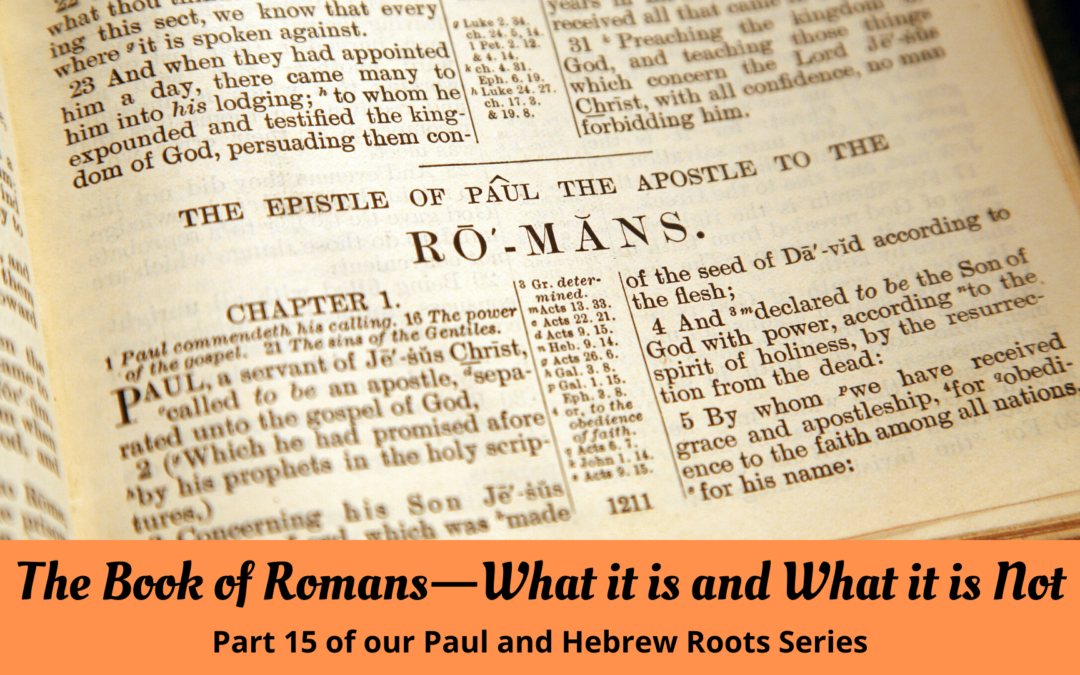
The Book of Romans-What it is and What it is Not–Part 15 of the Paul and Hebrew Roots Series
The Niddah Laws–Still in Effect Today ?
The Question of Niddah One question that seems to pop-up a lot from members of our Faith Community has to do with the Laws related to Niddah. Are the laws of Niddah still valid for today’s Torah Observant Disciples of Yeshua Messiah? And in case you aren’t familiar...
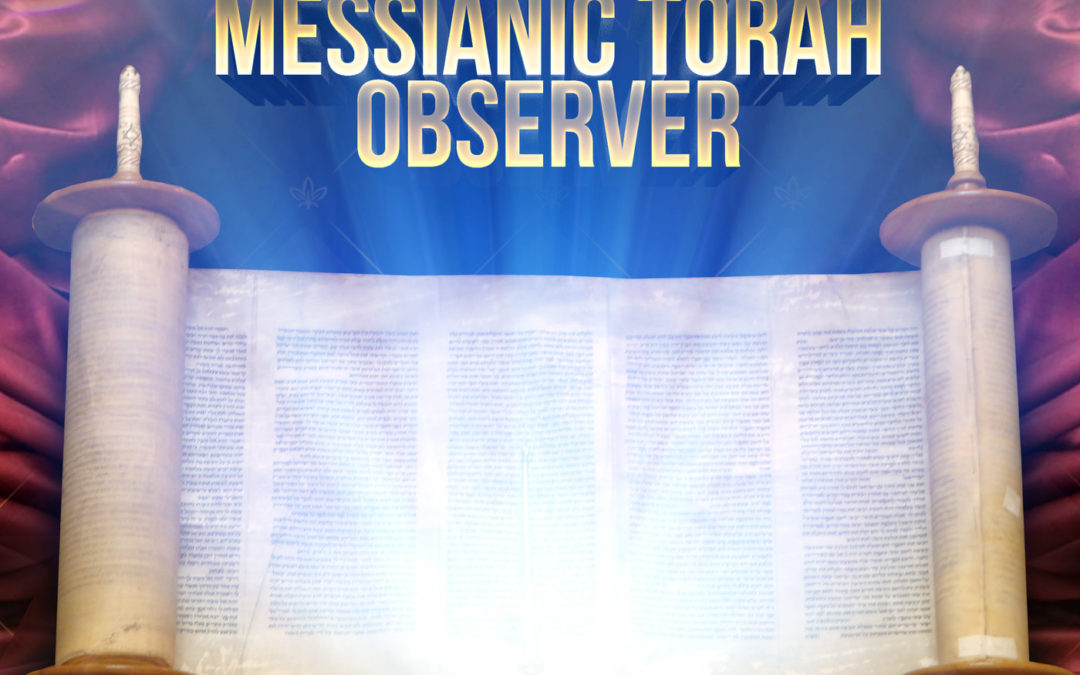
Mark of the Beast: What Are You Going To Do When They Come For You?
The world’s power-brokers are suggesting implementing a tracking mark to distinguish those immune to the current virus from those not. Mark of the Beast? What will you do when they come for you?
The Feast of Unleavened Bread: A Ridiculously Long Week
My Struggle With Time One of the many things I struggle with in this life is the issue of time.Time is an enemy. It is often stressful. There never seems to be enough of it to go around. Time moves by so swiftly. And I often find myself fearful of wasting it; losing...
Our First Passover–An Overview of the First Passover Exodus Chapters 1 through 12
Exodus 1 70 blood relative of Jacob enter Egypt-->Joseph dies as well as the Patriarchs. Israelites grow in number. A pharaoh who did not know Joseph enslaves the Hebrews, yet the Hebrews flourish in number. Pharaoh orders every male infant be cast into the...
Sins Committed by Mistakes are Still Sins–Torah Reading 77
Vayikra 4:1-35; Ezekiel 18:1-18 Revelation 5:6-10 Unintentional Sins Unintentional sin may be better defined as acts of unfaithfulness; sins committed without knowledge; or sins resulting from carelessness (such as manslaughter that may result in the guilty person...
Rosh Hashanah Happy Biblical New Year and Guarding the Month Aviv
The Command to Guard the Month of the Aviv First Day of the Month of the Aviv and the head of the Biblical New Year--Rosh Hashanah; Month of Nisan in Jewish circles. We must first understand what it is we're guarding. Why is it important? What it's composed of. We...
The Coronavirus Pandemic in Relation to God’s People
Fear and uncertainty has gripped the world. Widespread infections (Italy just announced 600+ deaths in one day; politicians and celebrities infected) Civil liberties are at risk of being severely curtailed or eliminated altogether. Personal and business incomes and...
The Brazen Laver–The Anointing Oil–Sacred Perfume–Messianic Reflections on Torah Reading 68
The Brazen Laver The Brazen Laver would sit between the Tabernacle and Brazen Altar. The Levitical Priests would be required to wash their hands and feet prior to entering the Tabernacle or facilitating/tending to the sacrificial offerings on the Brazen Altar...
The Significance of the Half-Shekel Ransom Offering to Messianics Today–Reflections on Torah Reading #68
The commandment given to the Hebrews by YHVH that they give a half-shekel ransom offering at the time of census holds tremendous prophetic and spiritual significance for today’s Messianic.

